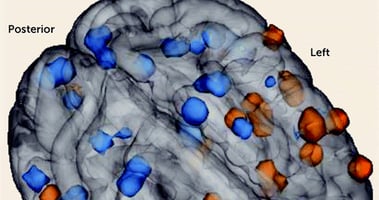Measuring the pattern of activity in the brain region known as the striatum may be able predict how...
Genotyping, Drug Metabolism Status May Predict Clinical Response to Risperidone
 |
Researchers from Australia, the United States, and Wales analyzed the effects of drug metabolism and variants of the potassium channel gene KCNH2 on clinical responses to antipsychotic medications among patients enrolled in the multicenter Clinical Antipsychotic Trials of Intervention Effectiveness (CATIE).
Previous studies have found that patients who have KCNH2 genotypes associated with increased expression of the potassium channel known as Kv11.1-3.1 tend to have a better response to antipsychotic medications in general.
The researchers found that in the CATIE study (N=362), patients with genotypes associated with increased Kv11.1-3.1 expression showed a better treatment response to risperidone compared with other drugs, but this association was dependent on metabolism status. That is, patients with KCNH2 risk genotypes and slow metabolizer status (approximately 7% of patients) showed marked improvement in symptoms when treated with risperidone compared with patients with fast metabolizer status or without the KCNH2 risk genotypes.
While the authors noted that more research is needed to inform clinical decision making, they concluded, “The data in this study strongly suggest that schizophrenia patients who are slow metabolizers and have KCNH2 risk-associated genotypes do better when treated with risperidone than with other antipsychotics, and they have by far the best response of anyone in the CATIE trial.”
For related information, see the Psychiatric News article “Blood Test May Predict Patients Likely to Develop Schizophrenia.”
(Image: Creations/shutterstock.com)





